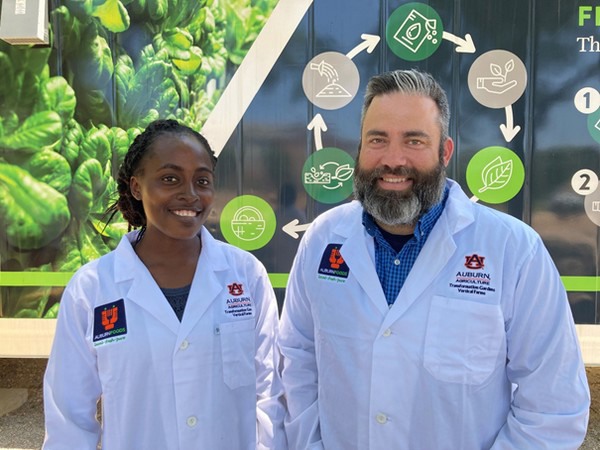“In Zambia, as in many other countries, women are at the forefront of providing food for their community. However, they rarely have secure rights to register land in their own names. Aquaponics could help them to grow food despite not having that,” says Dorcas Lukwesa, founder of Mobile Aquaponics. In-between her studies and ambition, Dorcas has designed an aquaponics system using one of the most available materials in her country: bamboo.
Dorcas first heard about aquaponics when she was doing her bachelor’s at EARTH University in Costa Rica. During her studies at EARTH, she came in contact with Associate Professor of Horticulture Daniel E. Wells at Auburn University, Alabama. He offered her an internship in summer 2021. She later joined his research program in Horticulture to pursue a Master of Science degree. While Dorcas’ research project is focused on refining the design for her Mobile Aquaponics system, she is participating in Wells’ overall research program which focuses on controlled environment agriculture
“In this program, I have the opportunity to finalize my aquaponics design with the help of my professor’s feedback. Of course, my curriculum focuses on high-tech growing, vertical farming, and so on. The idea is to learn from advanced systems and the exposure you get here and use that knowledge in Zambia to grow with the resources available. When I return to my community, I’ll be able to use my expertise to grow efficiently. The university gives us the resources to build something we will use for real.”
 Dorcas with her supervisor Dr. Wells Associate Professor of Horticulture at Auburn University. Photo by Mollie Smith Outreach programs manager at Auburn University Aquaponics Facility.
Dorcas with her supervisor Dr. Wells Associate Professor of Horticulture at Auburn University. Photo by Mollie Smith Outreach programs manager at Auburn University Aquaponics Facility.
For the design aspect of her project, Dorcas and Wells reached out to Professor Rusty Lay in Auburn University’s Department of Industrial Design. While Wells and Dorcas focus on making aquaponics work in a small system, Lay is focused on making the system mobile and ergonomic for users.
Introducing aquaponics to Zambia
Back home in Zambia, Dorcas is in the process of building prototype systems of her aquaponics system. “In Zambia, aquaponics is hardly practiced, as all farmers depend on rain to nurture their crops. However, with the increasing droughts, changes in rain patterns, water scarcity we are seeing, many farmers lose their crops. I’ve seen people cry after they realize that almost all their investments are gone due to droughts or other related issues. For that reason, aquaponics will offer growers more stability and a proper income since it is water efficient. It also allows people to grow more vitamin-rich crops such as lettuce, spinach, kale, and tomatoes.
Considering the feasibility of the growing systems is very important. After all, when there is an unlimited budget, things are easier. However, in most regions, also in Zambia, not all resources are that easily available. For that reason, Dorcas is not focusing on what is technically possible, but rather on what is available in her community. Dorcas is constantly in contact with her community back in Zambia, so that when she’s back, it won’t be that difficult to find resources and start growing again.” One of the limiting factors is often electricity. “High tech systems need a lot of power, which is rather expensive and inconsistent in the country. However, what we do have in Zambia is unlimited sunlight. That’s why we aim to use that to the fullest potential,” she adds.
Recycled materials
Already in Auburn, Dorcas is using materials that can be recycled multiple times. “In my region, farmers use tanks for fermenting cassava. But these tanks can also be used to hold fish for an aquaponics system. We also use lots of bamboos, as it grows in abundance. Besides that, it’s much more sustainable than using plastic tubes.”
Dorcas is involved in a network called CAMFED: Campaign for Female Education. “It is easier to work with networks that already exist and to reach out to people from there on. We aim to teach women how the aquaponic system works, so that in the end they will be able to develop their own system,” explains Dorcas.
According to her, it takes some investment to build the system, so people might be hesitant to start using it without knowing how it works. “My study in the US allows me to learn how to adequately respond to needs that women in my country have.”
For more information:
Mobile Aquaponics
Dorkas Lukwesa
www.resolutionproject.org
